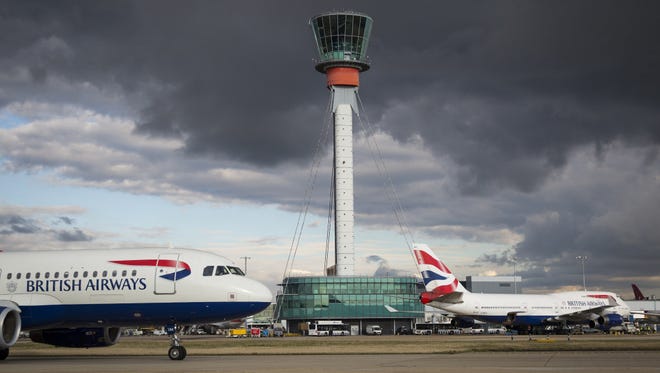Britain's skies run out of room for planes. TGIF
 Kim Hjelmgaard
Kim Hjelmgaard
Air-traffic controllers in the United Kingdom warned Friday that there are so many planes in the air that the country's skies are quickly running out of room.
The National Air Traffic Control Service expected Friday to be the busiest day of the year with a record 8,800 flights criss-crossing British airspace.
That figure may not seem like much compared to the United States, where the National Air Traffic Controllers Association says there are an estimated 87,000 flights each day.
But the U.K.'s total land area is about 94,000 square miles whereas the U.S. has a land mass of 3.8 million square miles — in other words, more than 40 times larger.
"We will soon reach the limits of what can be managed without delays rising significantly," said Jamie Hutchison, the director of Britain's NATS.
IN PICTURES: 30 cool aviation photos (story continues below)

Over the course of the summer, air-traffic controllers in the U.K. will likely manage 770,000 flights, which is 40,000 more than last year. The reason for the uptick, according to NATS, is to do with British fliers shunning more politically volatile destinations such as Egypt, Turkey and Tunisia in favor of the U.S., Spain and Italy.
NATS said that shift had "resulted in major changes in the flows of traffic, and with many schools now breaking up the demand for flying is expected to reach new levels."
Hutchison said that the way planes are guided across British airspace needed modernization. "The U.K.’s airspace was designed decades ago and doesn’t allow us to take advantage of the technology on board modern aircraft that would raise capacity, and also reduce emissions and noise for communities on the ground."
After a lengthy review, the British government decided last year that it wants Heathrow Airport — Europe's busiest — to get a third runway. However, if it gets final approval it won't be built for at least a decade and faces opposition from local residents who could see their homes compulsorily acquired for the development against their wishes.
It's not clear if an expanded Heathrow would ease or further burden British airspace.
Still, Britain's Department for Transport said if the way airspace is managed doesn't change, by 2030 there will be 3,100 days’ worth of flight delays each year. That's 50 times more than in 2015. Eight thousand flights would be cancelled annually.
In its most recent report, published on July 14 but covering the month of May, the U.S. Department of Transportation said carriers that reported performance data showed that 21% of their flights were delayed. The most frequent cause of delays were late-arriving aircraft (7.4%) followed by aviation-system delays (6.9%), maintenance or crew problems (5.2%), extreme weather (0.4%) and for security-related reasons (0.02%).